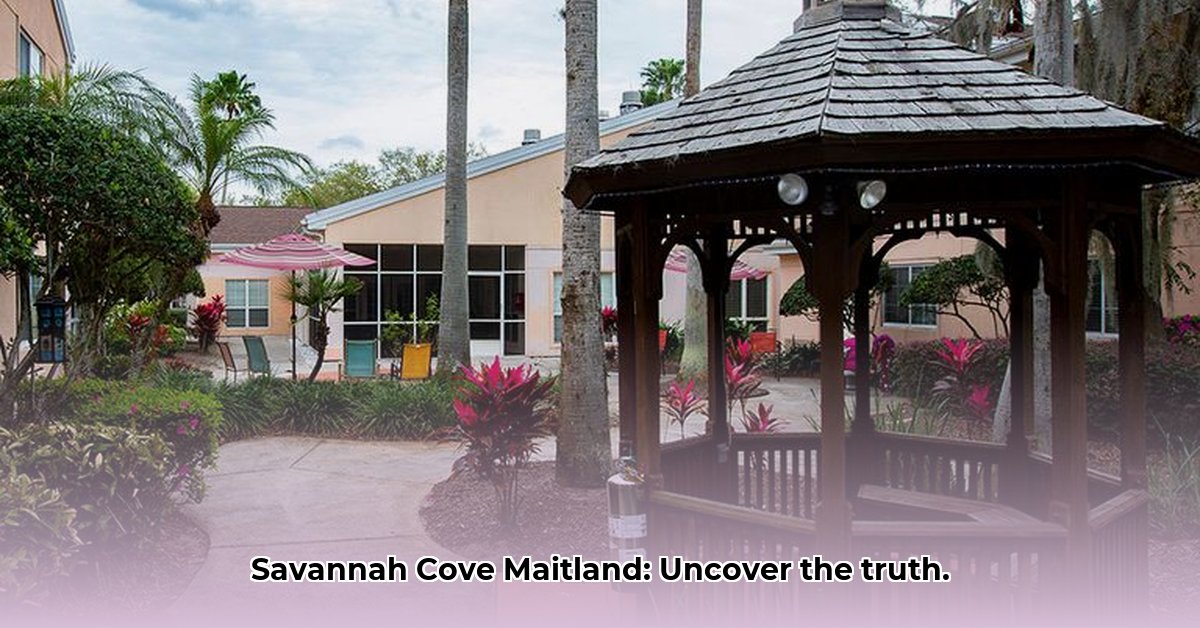
Understanding Savannah Cove Maitland FL's Performance
This report analyzes the quality of resident care at Savannah Cove in Maitland, Florida, based on publicly available data. Our aim is to provide an objective assessment, identifying areas of strength and weakness, and suggesting actionable improvements. Due to limitations in publicly accessible data specific to Savannah Cove, this report will utilize comparative analysis with statewide averages and industry best practices. Further investigation, including access to internal facility data, would provide a more comprehensive evaluation.
Key Performance Indicators (KPIs) at Savannah Cove Maitland FL
Evaluating nursing home performance requires examining several key indicators. These include staffing levels, infection rates, fall rates, and resident/family satisfaction scores. Unfortunately, detailed, publicly available data on Savannah Cove's specific KPIs is limited. However, by comparing it against statewide Florida averages, we can highlight potential areas for improvement.
How effectively are Florida's nursing homes addressing staffing challenges, a significant concern across the nation? A nationwide study linked insufficient staffing to increased infection and fall rates. While we lack Savannah Cove's specific data, this correlation necessitates further investigation into its staffing levels and their potential impact on resident safety and well-being. Is there a direct relationship between staffing levels at Savannah Cove and resident outcomes?
Addressing Challenges at Savannah Cove Maitland FL
Improving care requires a multifaceted approach focused on data collection, staffing solutions, infection control, fall prevention, and resident involvement:
Enhanced Data Collection and Transparency: Improving data collection and public reporting is crucial. This includes the regular and transparent publication of relevant KPIs, allowing for more accurate assessments and targeted interventions.
Strategic Staffing Solutions: Addressing staffing shortages requires a multi-pronged strategy. This may involve competitive compensation and benefits packages, targeted recruitment campaigns, and innovative staffing models. How can Savannah Cove attract and retain qualified staff in a competitive market?
Robust Infection Control Protocols: Implementing and rigorously enforcing comprehensive infection control protocols is paramount. This includes regular staff training on up-to-date infection prevention techniques, regular environmental cleaning, and prompt reporting and management of infections.
Comprehensive Fall Prevention Program: A well-defined fall prevention program includes risk assessments for each resident, environmental modifications to minimize fall risks, and regular staff training in fall prevention techniques. What targeted interventions can Savannah Cove utilize to lower its fall rate?
Strengthening Resident and Family Communication: Open communication with residents and their families is essential. Regular feedback mechanisms, including surveys and family meetings, provide valuable insights and foster a collaborative care environment. How can the facility enhance communication and involve residents in the decision-making process?
Stakeholder Responsibilities at Savannah Cove Maitland FL
Improving care at Savannah Cove requires shared responsibility among all stakeholders:
| Stakeholder | Responsibilities |
|---|---|
| Savannah Cove Management | Proactive data collection, staff training, investment in safety measures, and open communication. |
| Residents & Families | Active participation in care planning and prompt reporting of concerns. |
| State Regulatory Agencies | Regular inspections, enforcement of standards, and promotion of data transparency. |
Future Outlook for Savannah Cove Maitland FL
The future of Savannah Cove hinges on collaborative efforts. Open communication among management, residents, families, and regulatory agencies is crucial. Investment in improved data collection, staffing strategies, infection control, and fall prevention programs is essential for enhancing the quality of resident care. Continuous quality improvement initiatives and the adoption of evidence-based practices will be key to optimizing care delivery and achieving positive outcomes. What innovative strategies can further enhance the resident experience and improve overall well-being at Savannah Cove?
How to Improve Infection Control in Florida Nursing Homes: A Focus on Practical Solutions
This section focuses on broader challenges within Florida's long-term care facilities (LTCFs) concerning infection control, drawing on publicly available information and research. This context helps contextualize some of the challenges faced by facilities like Savannah Cove.
The persistent high number of infection control deficiencies in Florida LTCFs highlights the need for systemic improvements. While regulatory improvements exist, practical implementation remains a challenge.
Key Takeaways:
- Staffing shortages remain a major barrier to effective infection control.
- Inadequate training and inconsistent resource allocation further complicate matters.
- A multi-stakeholder approach—including administrators, infection preventionists, and regulatory agencies—is imperative.
This broader analysis reinforces the need for Savannah Cove to proactively address infection control, aligning itself with industry best practices and state-level initiatives. The need for robust training, adequate staffing and readily available, appropriate resources is clear.
📚 https://www.ajicjournal.org/article/S0196-6553(24)00762-4/fulltext (Accessed: 2025-02-16)